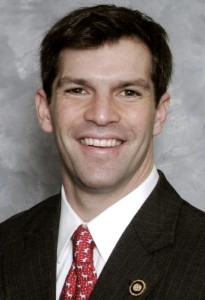William Faulkner once wrote that in the South, the past isn’t dead — it isn’t even past.
His words seem eerily appropriate as two Southern Republican presidential candidates are confronted with the racial skeletons in their closets.
First it was Texas Gov. Rick Perry and “Niggerhead,” the alleged name of his family’s hunting camp. Now, it’s fellow Texan Ron Paul’s sundry offensive statements about blacks, arguing among other things that in the wake of the Los Angeles riots, “order was only restored when it came time for the blacks to collect their welfare checks,” and that “95 percent of black men in Washington are semi-criminal or entirely criminal.”
 As Perry and Paul probably know, the modern Republican Party has its rhetorical roots in George Wallace and Barry Goldwater’s states’ rights rhetoric from the 1960s. Wallace laid the foundation for a generation of Republican hegemony in presidential elections via deft manipulation of racial and cultural issues; Richard Nixon and his guru Kevin Phillips studied Wallace’s tactics closely. Nixon’s 1969-’72 strategy, which focused on appealing to the 10 million Wallace voters from ’68, heralded a partisan realignment that would shape American politics for the next half-century, as Phillips himself predicted in 1969’s “Emerging Republican Majority.”
As Perry and Paul probably know, the modern Republican Party has its rhetorical roots in George Wallace and Barry Goldwater’s states’ rights rhetoric from the 1960s. Wallace laid the foundation for a generation of Republican hegemony in presidential elections via deft manipulation of racial and cultural issues; Richard Nixon and his guru Kevin Phillips studied Wallace’s tactics closely. Nixon’s 1969-’72 strategy, which focused on appealing to the 10 million Wallace voters from ’68, heralded a partisan realignment that would shape American politics for the next half-century, as Phillips himself predicted in 1969’s “Emerging Republican Majority.”
So when Ronald Reagan went to Philadelphia, Miss., where three civil rights workers were brutally murdered in 1963, to kick off his 1980 general election bid and proclaimed that “the spirit of Jefferson Davis lives in this year’s Republican Party platform,” it was no accident. Rather, it was a rare statement of the Republican Party’s fundamental strategy since 1964.
It was a strategy that Reagan/Bush 41 guru Lee Atwater perfected with 1988’s Willie Horton ad, which showed the black convicted murderer’s menacing face before fading into a series of men in prison jumpsuits walking through a revolving door in and out of a facility. The door, of course, represented the furlough program overseen by soft-on-crime Massachusetts Democrat Michael Dukakis. His program had allowed Horton a weekend pass during which he allegedly raped and kidnapped a woman. The ad said that Michael Dukakis was soft on crime. But what the ad hoped to communicate was that the Democratic Party was soft on black people.
That ad helped lead to a massive Dukakis defeat in which he lost every Southern state, despite his selection of a Texan running mate. Soon thereafter, Rick Perry realized that the Democratic Party was not the home for an ambitious Texas pol and became a Republican at the urging of Karl Rove, whose campaign for president of the College Republicans Atwater once managed. Around the same time, Paul rejoined the Republican Party after running for president on the Libertarian ticket, apparently secure in the knowledge that his libertarian (read: states’ rights) views could find a comfortable enough home there.
 But amid the media’s scrutiny of Paul (and of Perry a few months ago), we should remember that their fiery pro-10th Amendment rhetoric merely is the latest piece of the oratorical thread George Wallace and Strom Thurmond wove — actually, originally woven by South Carolinian John C. Calhoun circa 1831 in the earliest regional justifications of the South’s “peculiar institution.”
But amid the media’s scrutiny of Paul (and of Perry a few months ago), we should remember that their fiery pro-10th Amendment rhetoric merely is the latest piece of the oratorical thread George Wallace and Strom Thurmond wove — actually, originally woven by South Carolinian John C. Calhoun circa 1831 in the earliest regional justifications of the South’s “peculiar institution.”
As Atwater once said, “You start out in 1954 by saying, “Nigger, nigger, nigger.” By 1968 you can’t say “nigger” — that hurts you. Backfires. So you say stuff like forced busing, states’ rights and all that stuff. You’re getting so abstract now [that] you’re talking about cutting taxes, and all these things you’re talking about are totally economic things and a byproduct of them is [that] blacks get hurt worse than whites.”
Instead of depicting the name of Perry’s farm or Paul’s repugnant ramblings as indications of aberrant political behavior, the media should stress that these candidates’ exaltation of states rights is a dog whistle to Republican voters conditioned by a generation of Republican politicians and operatives before them who exploited racial fears for personal and partisan advancement.
The racial snags of the current Republican field have — with the help of late-night comics and a willing media — reminded suburban swing voters that Republicans produce some pretty nutty candidates with views that are far out of the mainstream. Indeed, the Republican Party’s past is coming back to haunt the party at a most inopportune time: just as it begins a campaign to oust America’s first black president.
Faulkner himself might have predicted it.
(Cross-posted, with permission of the author, from St. Louis Today)










Leave a Reply